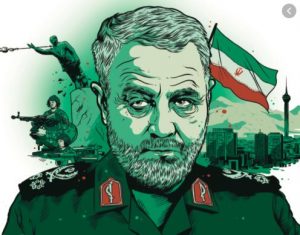“Iran and the US should negotiate face to face to make a new nuclear deal”, Says Mohammad Hatami Milanlou

All Global Research articles can be read in 51 languages by activating the “Translate Website” drop down menu on the top banner of our home page (Desktop version).
To receive Global Research’s Daily Newsletter (selected articles), click here.
Follow us on Instagram and Twitter and subscribe to our Telegram Channel. Feel free to repost and share widely Global Research articles.
***
There is indication that the P5+1 (US, UK, Russia, China, France and Germany) will agree to a new nuclear deal. The EU foreign policy chief Josep Borrell traveled to Tehran and succeeded in gaining a resumption of indirect talks between the US and Iran in Qatar. Trade between Iran and the EU reached $5.07 billion in 2021, up 9 percent compared to the previous year. The war in Ukraine has caused the EU to urgently seek the Iran nuclear deal. Borrell said in May, “We Europeans will be very much beneficiaries from this (nuclear) deal, the situation has changed now.
For us it was something… ‘well, we don’t need it (Iranian crude).’ Now it would be very much interesting for us to have another supplier.” The Biden administration wants to sign a new deal as a campaign promise delivered, as well as an alternative to a military conflict with Iran, which would not be supported by the American people who are suffering in an economic crisis. Steven Sahiounie of MidEastDiscourse interviewed Mohammad Hatami Milanlou, who is an expert in international political science affairs, with an emphasis on Europe and the US. The interview covers the Iran deal, Iraq, Saudi Arabia, Russia and Qatar.
*
Steven Sahiounie (SS): Recently, the French President Macron said a new Iran nuclear deal must be signed. In your opinion, do you see any progress towards a new nuclear deal?
Mohammad Hatami Milanlou (MHM): Considering that the process of nuclear negotiations between Iran and the West is slow and also considering that the main problem of the negotiations is the direct negotiation between Iran and the United States, these two should negotiate face to face and solve the main problems, of course, until the negotiations between Iran and the United States take place, especially the American side is willing to make demands, but not lift sanctions.
SS: The Israeli occupation is working on building an Arab-Israeli alliance against the Islamic Republic of Iran. How do feel Iran might react?
MHM: There are two factors that have made Iran more isolated and weaker in front of Israel and the Arab countries. The first is the death of Qassem Soleimani and the second is the internal riots caused by Iran’s wrong nuclear policies. This incident has caused Israel’s role in the region to become more prominent, and the United States, through the fear it has created for the Arabs, can strengthen this agreement through Iran.
SS: Iraq is working on reestablishing the relationship between Tehran and Riyadh. In your opinion, will this attempt be successful and what impact it will have on the region?
MHM: On the one hand, Iraq is the scene of conflicts between parties and groups, and on the other hand, it is the scene of the proxy battle of the country. Regarding the issue of Iraq, it must be said that Iraq was a single country before the fall of Saddam Hussein, but now is several parts after the fall of Saddam and the establishment of inefficient pro-American governments. Saudi Arabia and Iran, as well as groups of parties such as Shiites, Sunnis and Kurds, as well as Iraq and its people, and it is also the source of Shiite taqilid, but in relation to the influence of Saudi Arabia and its position in Iraq, it should be said that Iran, as I said, with the death of Qassem Soleimani and the sharp decrease in the influence of Iran, Saudi Arabia was able to increase its influence in Iraq by attracting Iraqi proxy groups, whether Shiites, Sunnis, or Kurds to support armed groups.
SS: Russia is engaged in a military operation in Ukraine. Russia and Iran are allies. In your opinion, will this relationship remain strong, and how will America react to their alliance?
MHM: No, the relationship between Iran and Russia is not permanent, because it has happened many times that Russia has betrayed Iran, and this relationship is more from the side of Iran, which is looking towards the East and is constantly trying to keep the support of both Russia and China, but the United States is also aware of this issue. The US knows that Iran is Russia’s toy.
SS: Recently, the Qatari foreign minister visited Tehran. Was he delivering a message from the US, and what was the response?
MHM: The message of the Qatari leader regarding the nuclear negotiations was that Iran should be soft towards the negotiations and stop its unreasonable demands, and the US wants Iran to return to the negotiation table.
*
Note to readers: Please click the share buttons above or below. Follow us on Instagram and Twitter and subscribe to our Telegram Channel. Feel free to repost and share widely Global Research articles.
This article was originally published on Mideast Discourse.
Steven Sahiounie is a two-time award-winning journalist. He is a regular contributor to Global Research.


